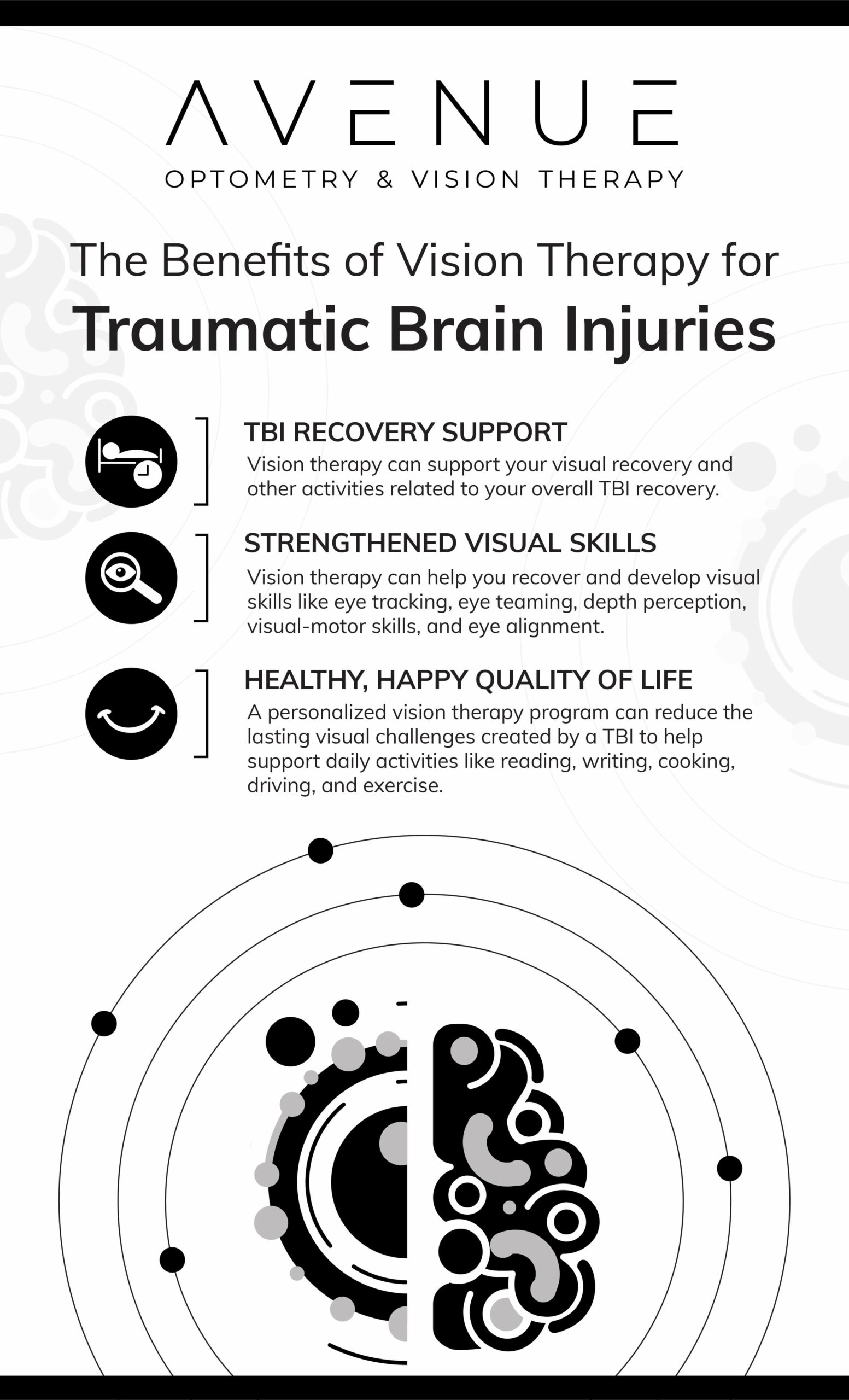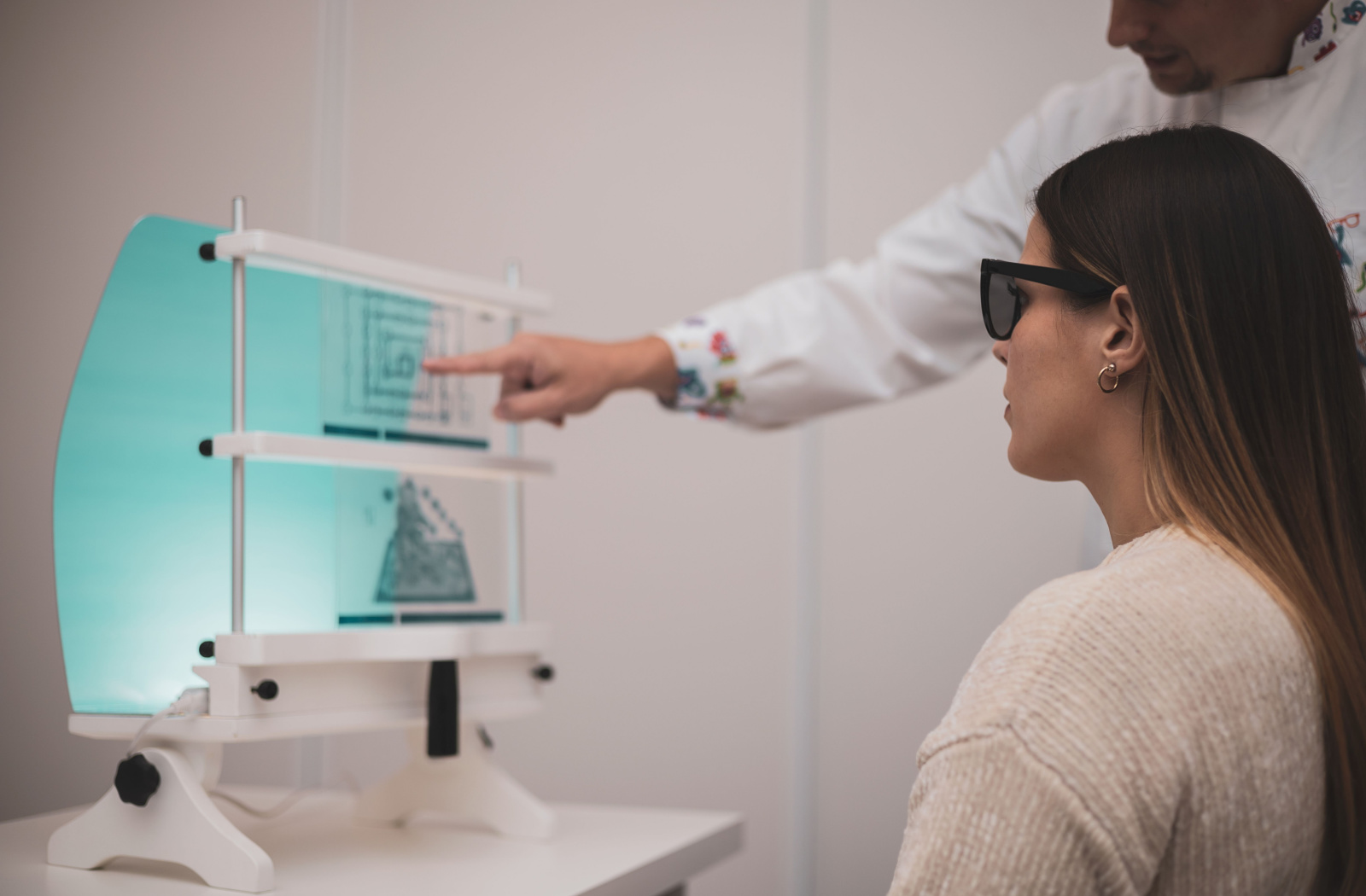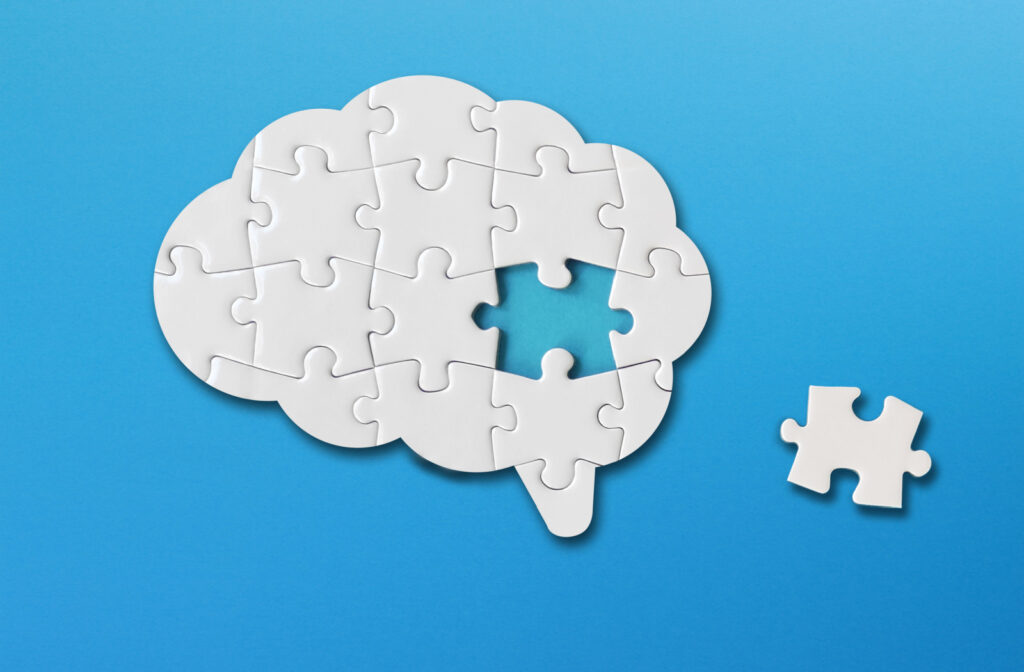Recovering from a traumatic brain injury (TBI) can be challenging—but it’s not something anyone has to do alone. Healthcare professionals can provide support for everything from physical recovery to vision therapy.
Sometimes, the visual effects and recovery associated with TBIs can go overlooked because of other serious effects, resulting in lasting changes to a person’s visual abilities and, ultimately, their quality of life. That’s never something we like to see.
Adding vision therapy to traumatic brain injury recovery plans can help facilitate healthy recovery from TBIs, improve a person’s visual skills and function after they’ve been affected by a TBI, and support their overall quality of life.
From strengthening visual skills after a fall or stroke to recovering from a sports-related brain injury with post-concussion vision therapy, there are many ways a personalized vision therapy program can help those experiencing the effects of TBIs.
What Is Vision Therapy?
Vision therapy is often thought of as a series of eye exercises, but that’s not really a complete picture of what vision therapy is or what it involves. A vision therapy program is a personalized approach to strengthening your visual skills and eye function with several forms of at-home and in-person treatment and support.
Vision therapy programs are tailored based on your needs to target specific visual challenges and strengthen the relationship between your eyes and brain to help you overcome vision problems.
Vision therapy can help with many vision issues and eye conditions, including amblyopia, strabismus, eye strain, and the effects of traumatic brain injuries. When vision therapy is used to support TBI recovery, it’s sometimes referred to as neuro-optometric rehabilitation therapy.
How Can Vision Help with Traumatic Brain Injuries?
Neuro-optometric rehabilitation therapy is a form of vision therapy that strives to help patients with traumatic brain injuries overcome their unique visual challenges with activities and exercises that rely on the brain’s neuroplasticity—the brain’s ability to change and adapt.
With specific eye-training exercises and technology, we can help you train your brain to strengthen your visual system and overcome the vision problems you might be experiencing after a TBI.
TBI Recovery Support
Along with their effects on your sight, visual challenges from TBIs can also affect your ability to participate in other parts of your recovery.
Unaddressed visual conditions caused by a TBI can continue to worsen, but vision therapy can stop them from progressing and reduce their overall effect on your life—helping make a full, healthy recovery from a TBI an achievable goal.
Strengthened Visual Skills
A TBI can reduce or change a wide range of visual skills, making it harder to focus at different distances, take in visual information, and use your vision for tasks like reading, cooking, driving, or sports.
A personalized vision therapy program can help you strengthen and recover visual skills affected by a TBI—and in some cases, vision therapy can even help strengthen visual skills further with programs like sports vision training.
Healthy, Happy Quality of Life
Those experiencing the effects of a traumatic brain injury know that there are lasting changes TBIs can have for a person’s quality of life, especially if treatments like vision therapy aren’t available to help support recovery.
Even simple challenges related to a person’s ability to read and process information can make daily life more difficult, not to mention the possible effects of increased eye strain, headaches, and other conditions.
Vision therapy can be the solution to those problems. The personalized approach of a vision therapy program can help those with TBIs overcome their unique challenges and live healthy, wholesome lives free from vision issues.

How Does Vision Therapy Work?
Each person’s experience with vision therapy differs based on their needs, but in general, programs designed to support TBI recovery involve several steps, including:
Diagnosis & Program Creation
This stage involves speaking with an optometrist or neuro-optometrist about your visual challenges and getting an eye exam to assess visual skills like eye tracking, depth perception, binocular vision, eye movement, and your visual field.
At-Home & In-Office Treatments
Our vision therapy programs include a variety of at-home and in-office treatments, technology, and exercises.
Some of the technology we use for vision therapy includes the RightEye vision system for helping patients overcome binocular vision challenges related to TBIs and certain eye conditions. We also use Optics Trainer, a virtual reality system with games and exercises that help strengthen several visual skills.
Ongoing Monitoring & Support
As part of our individualized approach to vision therapy, we continuously monitor your progress, assess your visual skills, and update your program based on your current needs.
We complete progress checks every 10 sessions to determine your needs for continued in-office programs and your ability to transition more into at-home maintenance therapy techniques.

What Is Considered a Traumatic Brain Injury?
A traumatic brain injury (TBI) can have several lasting effects on a person’s quality of life, ranging from speech challenges and impaired motor skills to a wide range of visual challenges.
A TBI can generally include any event that causes brain damage and lasting neurological effects. Falls, blunt force trauma, and car accidents are some of the most common TBIs in Canada.
What Are the Visual Symptoms of a TBI?
90% of people who experience a TBI also experience some form of vision disruption. Some of the more common visual challenges caused by TBIs include:
- Light sensitivity
- Blurry vision
- Reading challenges
- Peripheral vision loss
- Headaches
- Eye strain
- Double vision
The problems above can worsen without an eye care professional’s support. Seeing your eye doctor for a comprehensive eye exam is vital for supporting your vision after a TBI and any time you notice changes to your sight.
How Do You Get Started with Vision Therapy?
Vision therapy diagnosis starts with an eye exam and a thorough consultation.
When you visit our team at Avenue Optometry & Vision Therapy for a vision therapy consultation, we take the time to speak with you about all your needs and challenges so that we can create a unique vision therapy program based on your eye health and goals.
Book an appointment today to get started with vision therapy.




